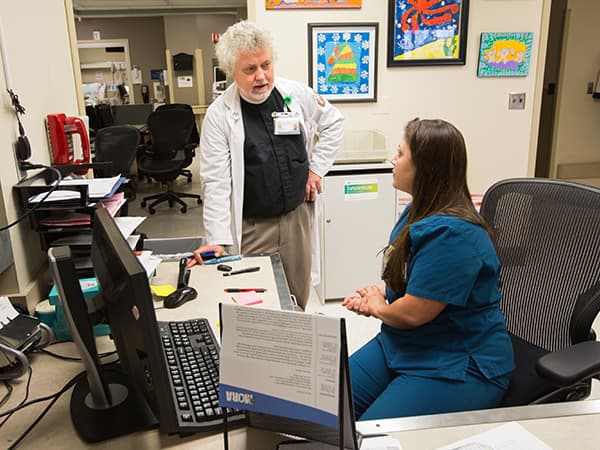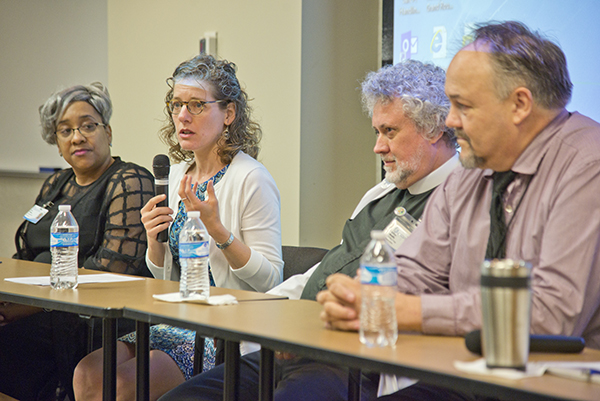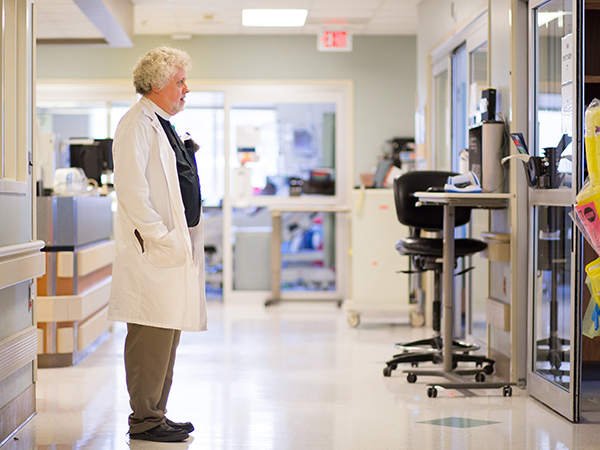Respect, compassion key to religion in workplace

Published in News Stories on April 20, 2017
They say religion and politics don't mix.
But how about religion and the workplace?
UMMC's Office of Diversity and Inclusion posed that complicated question Tuesday during an “Inclusive Conversations” series group discussion that attracted employees and students from across the spectrum. The lesson at hand was how to have a civil discussion about religion, faith and professionalism in the workplace, and to make more inclusive communities for those with varying religions and ethical or moral beliefs.
When you're in America's Bible Belt, that can be harder than you'd think. Having respect for those whose beliefs aren't yours, however, can go a long way, a group of panelists agreed.
“Faith is a deeply personal matter. It must not be allowed to influence policy,” said Rabbi Debra Kassoff of Beth Israel Congregation in Jackson. “At the same time, strongly held faith is part of our being. It shapes how we see the world.
“For me, it's simple. Each of us should let faith shape us,” she said. “Do not allow your faith to be a measuring stick for how you judge others.”

Doris Whitaker, left, director of pastoral services; Rabbi Debra Kassoff, second from left, of Beth Israel Congregation; Murphy, second from right; and Darrell Troth, a Jackson Medical Mall Foundation employee, discuss religion's role in the workplace.
In a place as diversified as the Medical Center, people often make assumptions about someone whose faith is different than their own. That can be hurtful, said Jeffery Murphy, a panelist and chaplain in Pastoral Services.
“I'm very careful,” said Murphy, who is ordained with the Disciples of Christ, a Protestant Christian denomination. “I keep that to myself. I almost never share it with patients. Sometimes, people say that people of non-Christian faiths don't understand love and compassion. That's a horrible statement.”
There will be people in the workplace who are “determined that their faith is the right faith,” said panelist Doris Whitaker, the Medical Center's director of Pastoral Services and an assistant pastor in the Church of God in Christ. “There's sometimes that rigidity that, as a Christian, doesn't make sense to me.”
Instead, Whitaker said, she is called to minister to everyone who seeks comfort, be they Wiccan, Baptist, another religion, or no religion.
Panelist Darrell Troth, an employee of the Jackson Medical Mall Foundation, describes himself as a humanist and atheist. He's seen religious persecution that goes against his concern for human welfare and dignity.
When he formerly worked at a retail giant in Jackson, Troth said, one of the store's managers in Pearl wanted to transfer a Muslim employee to the Jackson store because the man went to his car and prayed during his break time. “We have no more work for this guy to do,” Troth said the manager told him.
“I've never forgotten that,” Troth said. “That's just prejudice. Humanism is strong. When we pull together, we can do good.”

Murphy pauses before entering a patient's room while making daily rounds through the Neuroscience ICU.
Some conservative Christian thinkers believe that if someone creates a safe space for those whose beliefs are different, “we are somehow betraying our own faith,” said Dr. Ralph Didlake, professor of surgery, associate vice chancellor for academic affairs and chief academic officer. He was among those who shared their thoughts during the interactive discussion.
As a young pastor, Murphy said, he ministered to a patient who was of Apache Indian heritage, but who converted to Christianity and the Baptist faith.
“He asked me if I could blend the two traditions for his funeral,” such as including Apache prayers and chants, Murphy said. “To me, that seemed like the most Christian thing that I could do, but I took flak from some people who said I was disrespecting Christianity.”
Also contributing to the discussion was Johnny Gilmore, a senior service partner in Human Resources, who said that in his 36 years at the Medical Center he's seen firsthand the work it takes to manage diversity in the workplace. “I've had the challenge of navigating religion and accommodating employees because of their faith,” he said. “I've seen the progress here at UMMC, and I'm proud of it.
“I'm a minister, but I check that at the door,” Gilmore said. “We have to be willing to work together.”
“My hope is that people will soften and learn to be compassionate,” Whitaker said. “We have to touch base with our hearts.”


